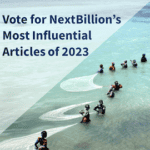Announcing NextBillion’s Most Influential Articles of 2022: Vote for Your Favorite!
NextBillion has been running our “Most Influential Article of the Year” contest since 2012, selecting the 12 most-read articles we’ve published each year and inviting readers to vote for their favorites. Since almost all our content is guest-written by entrepreneurs, investors, researchers and others working in impact-focused business in emerging markets, the contest serves as a barometer of sorts, highlighting key topics of interest in these sectors.
That’s why I’ve always found it fascinating to see how the topics of these articles change in response to external events and sector-specific trends. Sometimes, global events dictate the focus of our guest writers’ and readers’ attention — for instance, it was no surprise that eight of the 12 articles in our 2020 contest dealt with the COVID-19 pandemic. Other times, these articles reveal vital discussions that are happening behind the scenes in boardrooms and investor meetings. For example, our 2019 contest included multiple articles exploring the “African investment frenzy” that was raising eyebrows at the time.
What can we learn from the topics discussed this year? If I had to identify a common theme among these articles, it would be: finding what works by addressing what doesn’t. Most of these pieces explore businesses, technologies and investment approaches that have demonstrated their positive impact — but that are falling short in maximizing it. They involve a wide range of subjects, including digital finance (and how it can reach lower-income segments); energy access (and the lack of funding that’s holding it back); and impact investing (and the measurement and gender equity challenges that have sparked criticism of the sector). But regardless of the topic, most of them have a shared focus on the need for improvement, even in successful approaches.
What does this mean for the broader community of entrepreneurs and investors looking to make a development impact in emerging markets? I’d view these discussions as a sign of the growing maturity of these sectors: We’ve long passed the point of proving the concept behind businesses aimed at lower-income customers: These markets can be profitable, as any number of companies have amply demonstrated. We’ve also moved past the wide-eyed early days of impact-focused enterprise, in which companies were sometimes based more on good intentions than a promising business model. These days, the guest writers who discuss their work on NextBillion typically have a detailed understanding of their market, often based upon a growing track record full of both successes and failures. This suggests that many impact sectors — and the businesses and investment firms that drive them — are now solidly in their adolescence: trying new things to see what works, adapting their strategies to pursue new opportunities, and reaching greater levels of success — only to be met with higher expectations.
We’ve listed the 12 articles in our 2022 contest in alphabetical order below, and we invite you to give them a read (if you haven’t already), and to vote for the one that impacted you the most. To vote, scroll to the bottom of this page and make your selection. You can also vote at the bottom of any individual article in the contest. You can vote up to one time per hour during the voting period, which will run from Dec. 21 to Jan. 3.
As always, we offer our endless thanks to our guest writers, for sharing their vital insights and analysis on our platform — and to our readers. Your support means the world to us. We wish you a happy holiday season and a prosperous new year.
Can Access to Smartphones Bridge the Digital Divide in Sub-Saharan Africa?
Amani M’Bale at the Bill & Melinda Gates Foundation and Graham A.N. Wright at MicroSave (MSC) discuss several factors that can increase — or limit — the usage of smartphones and other mobile devices in sub-Saharan Africa.
Changing the Gatekeepers: Why Female Fund Managers Are the Key to Unlocking More Inclusive Capital
Melanie de Nysschen at SAVCA and Yeabsira Zewdie at MiDA Advisors share insights from interviews with female fund managers in South Africa, Namibia and Botswana that reveal their biggest challenges.
Lucie Klarsfeld McGrath and Louise Berthault at Hystra explore a new report that analyzes data from 21 organizations that rely principally on women direct sales forces to sell health-related products.
Iwona Bisaga at Modern Energy Cooking Services and Julia Tomei and Tash Perros at University College London examine failures in the clean cooking sector, and call for more discussion of these setbacks.
Varad Pande and Twinkle Malhan at Omidyar Network India propose a new approach to creating impact across the lifecycle of investments — from sourcing higher-impact deals, to supporting investees’ efforts to sustain and increase their impact.
Savings-Led Digital Finance: The Dawn of a New Era?
Philip Acton and Finn Tiedemann at DreamStart Labs Inc. explore growing concerns about the risky practices used by some digital lenders, and argue that one solution may come from a new generation of “savings-led” digital finance apps.
Koen Peters at GOGLA assesses the momentum and impact of off-grid solar, explaining why much faster progress — and much greater funding — is needed for the sector to address the increasingly urgent challenges of climate change.
Dana Gorodetsky and Sachin Nijhawan at the William Davidson Institute examine the benefits of commercialization for researchers, institutions and entrepreneurs, and offer four key lessons for commercializing research in LMICs.
Dianne Calvi at Village Enterprise and Brian Boland at the Delta Fund discuss the results of a randomized controlled trial conducted on Africa’s first development impact bond for poverty alleviation, exploring what they mean for the evolution of results-based funding.
Margi Goelz at Georgetown University and Bridget Bradley at Tetra Tech explain how an innovative blended finance facility has supported a Kenya-based energy company, and how this approach can benefit other small- and medium-enterprises in emerging markets.
Where the ‘New Formal’ is the New Normal: Lessons on Innovation from India’s Artisan Economy
Priya Krishnamoorthy and Aparna Subramanyam at 200 Million Artisans and Anandana Kapur at the Harvard Kennedy School examine the lack of support for informal creative businesses, suggesting ways to empower these enterprises and the communities they serve.
Why Social Enterprises Struggle to Measure Impact – And What Impact Investors Can Do About It
Spencer MacColl at Kiva shares data on the impact measurement practices and challenges of the microfinance institutions and other social enterprises Kiva supports, highlighting some key lessons for the broader sector.
James Militzer is the managing editor at NextBillion.
Photo adapted from an image by CCAFS/2014/Prashanth Vishwanathan.
Sorry. This form is no longer available.
- Categories
- Agriculture, Coronavirus, Energy, Environment, Finance, Impact Assessment, Investing, Social Enterprise, Technology



